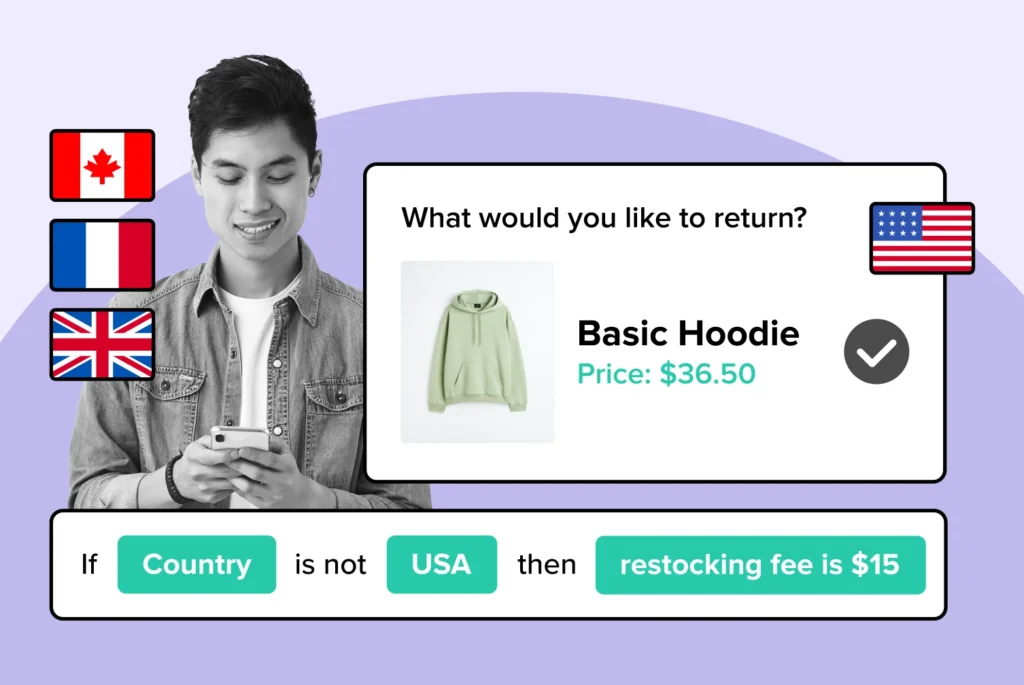
Mastering Sustainability in Ecommerce Returns: Strategies for a Greener Future
Environmental stakes are higher than ever: discover how your business can adapt its returns process to be part of a greener eCommerce future.
Shipping, Tracking & Notifications
Boost customer experience and reduce support tickets
Realtime order and shipment tracking
Proactive order and shipping notifications
AI-Enhanced Discounted Labels
Predictive pre-purchase estimated delivery dates
Self-Serivce branded order tracking
Effortless experience delivered
Identify and Resolve Order Issues
Realtime order and shipment tracking
Make returns profitable and delight customers
Flexibility to define any return destinations & conditions
Simplify returns for your customers and team
Incentivize exchanges over returns
Returns management made easy for your team
Returns management made easy for your team
Easy claims and smart upsells
Understand why your customers are returning
In-Store & Curbside Pickup
Unify the online and the in-store experience
Hassle-free pickup experience for customers
In-Store dashboard to keep operations streamlined
In-Store and Online orders unified
Drive foot-traffic to your stores
Shipping, Tracking & Notifications
Boost customer experience and reduce support tickets
Realtime order and shipment tracking
Proactive order and shipping notifications
AI-Enhanced Discounted Labels
Predictive pre-purchase estimated delivery dates
Self-Serivce branded order tracking
Effortless experience delivered
Identify and Resolve Order Issues
Realtime order and shipment tracking
Make returns profitable and delight customers
Flexibility to define any return destinations & conditions
Simplify returns for your customers and team
Incentivize exchanges over returns
Returns management made easy for your team
Returns management made easy for your team
Understand why your customers are returning
In-Store & Curbside Pickup
Unify the online and the in-store experience
Hassle-free pickup experience for customers
In-Store Dashboard to keep operations streamlined
In-Store and Online orders unified
Drive foot-traffic to your stores
Boost customer experience and reduce support tickets
Realtime order and shipment tracking
Proactive order and shipping notifications
AI-Enhanced Discounted Labels
Predictive pre-purchase estimated delivery dates
Self-Serivce branded order tracking
Effortless experience delivered
Make returns profitable and delight customers
Flexibility to define any return destinations & conditions
Simplify returns for your customers and team
Incentivize exchanges over returns
Returns management made easy for your team
Equip your team for precise return checks.
Easy claims and smart upsells
Understand why your customers are returning
Unify the online and the in-store experience
Hassle-free pickup experience for customers
In-Store Dashboard to keep operations streamlined
In-Store and Online orders unified
Drive foot-traffic to your stores
Find the answer to all your questions
Take a step by step trip through our functionality to see how we can improve your ecommerce processes.
Explore the most comon questions about WeSupply
Calculate the ROI that WeSupply can bring you
Request a no strings attached review of your current shopping experience and missed conversion opportunities
Read actionable articles on how to optimize your post-purchase experience and decrease support tickets
Get inspired by stories of how our customers implemented an effortless post-purchase experience
Wondering if WeSupply is a good fit for you? Read through our use cases to see how we can help you increase conversion & improve CX!
A Deep Dive into Top Companies' Order Tracking & Returns Strategy
Find the answer to all your questions
Explore the most comon questions about WeSupply
Calculate the ROI that WeSupply can bring you
Request a no strings attached review of your current shopping experience and missed conversion opportunities
Take a step by step trip through our functionality to see how we can improve your ecommerce processes.
Read actionable articles on how to optimize your post-purchase experience and decrease support tickets
Get inspired by stories of how our customers implemented an effortless post-purchase experience
A Deep Dive into Top Companies' Order Tracking & Returns Strategy
Wondering if WeSupply is a good fit for you? Read through our use cases to see how we can help you increase conversion & improve CX!

Cultural differences in ecommerce returns can significantly impact a business’s international success. Customers around the world react differently to return policies, which can be perplexing for online retailers. This article demystifies these behaviors, offering insights on tailoring return strategies to diverse cultural expectations while balancing business efficiency. Discover how cultural sensitivity in returns can enhance customer satisfaction and trust globally.
Cultural nuances significantly impact eCommerce returns, affecting customer perceptions and behaviors, making it crucial for online retailers to tailor their return policies and customer service strategies to align with regional norms and customer expectations.
Legal requirements and cultural attitudes towards returns differ globally, necessitating that eCommerce businesses understand and comply with local consumer protection laws, while also respecting cultural preferences to maintain a positive brand image.
Building trust and ensuring customer satisfaction across cultures is essential for eCommerce success, requiring strategies like offering multilingual support, clear product information, and adapting to cultural expectations in communication and advertising.
WeSupply addresses cultural differences in eCommerce returns by enabling country-specific policies, customizable return fees, self-managed return shipping, and tailored return experiences. With extensive integrations, it simplifies global logistics, enhancing customer satisfaction and reducing costs. Tackle international return challenges with WeSupply—Get Started now.
The landscape of eCommerce returns is as diverse as the global market itself. From the American quest for clarity to the German need for precision, cultural differences play a significant role in how online shoppers perceive and engage with the return process in the online environment. Notably, the shift in returns culture facilitated by eCommerce has pressured online stores, as well as other online retailers, to integrate more generous and customer-friendly return policies to remain competitive.
Balancing these policies with operational costs and cultural sensitivities is a complex task that can make or break an e-commerce company’s success in the international arena.
In this globalized era, the ability to navigate through cultural nuances is becoming increasingly important for eCommerce businesses. Providing personalized customer service tailored to the cultural backgrounds of customers can help build trust, reduce misunderstandings, and ultimately reduce the frequency of returns. Moreover, addressing the reasons behind returns such as improving product descriptions or enhancing sizing guides can significantly improve business operations.
Accommodating cultural peculiarities in communication is critical in international eCommerce. For instance, while the American approach leans towards casualness, Germans tend to prefer a more formal tone. This awareness extends beyond communication style to voice tone and volume, which can prevent misunderstandings in customer interactions and potentially reduce returns.
How we see and engage in the world is largely influenced by our cultural backgrounds, and eCommerce is no exception. Multilingual customer support and localized return policies can cater to diverse cultural preferences in eCommerce returns, creating a smoother and more positive shopping experience. In fact, personalizing communication and understanding cultural expectations can potentially reduce the frequency of returns.
Retailers can also use returns management as part of their customer acquisition strategy, understanding that a culture of returns is now deeply ingrained in the consumer psyche. Multiple return options cater to customer convenience and can also benefit retailers in managing inventory and shipping costs. However, cultural awareness is also crucial in addressing consumer expectations for security in online transactions, which can influence online shopping and return behaviors.
As we recognize the influence that cultural differences have on the eCommerce landscape, it’s essential to delve into how these differences shape return behaviors and online purchase behavior. From the social stigma associated with returning products to the influence of local regulations, the cultural impact on return behaviors is multi-faceted.
Consequently, understanding these cultural attitudes towards returns is crucial for online retailers aiming to navigate the complexities of the global eCommerce market.
Return rates vary across cultures, reflecting the diverse attitudes towards returns. For instance:
Chinese customers often show limited interest in return policies, preferring to keep the products they buy
Italian customers are more concerned with return policies, desiring protection against making incorrect purchases
Russians and Japanese customers tend to expect better and more personal attention in customer service, which can influence their return behaviors.
These differences highlight the necessity of understanding cultural nuances to effectively manage eCommerce returns.
Regardless of cultural background, WeSupply leverages detailed Returns Analytics to unravel the nuanced behaviors driving return rates across different cultures. By identifying the most returned products and understanding the specific reasons behind these actions, businesses can tailor their processes, products, and policies to better meet diverse customer expectations. This strategic approach not only reduces return rates but also significantly improves profit margins. Moreover, by segmenting returns by region, WeSupply provides actionable insights that highlight cultural impacts on return behaviors, enabling companies to address and adapt to regional differences effectively.
The act of returning a product can evoke a range of emotions and perceptions, shaped heavily by cultural norms. In some cultures, returning a product may be associated with a loss of face, implying a failure in the purchasing decision, while cultural differences in attitudes towards returns must be understood as they influence how frequently customers engage in returning products.
The psychological impact of cultural identities on product returns is profound. For instance, Third Culture Individuals (TCIs), who have spent a significant part of their developmental years outside of their heritage culture, may experience different psychological impacts upon returning products due to their unique cultural identifications and experiences. This underlines the important role that cultural understanding plays in managing eCommerce returns.
Local regulations and cultural norms significantly shape return practices in eCommerce. Some strategies that can address cultural differences and improve the returns experience for customers globally include:
Tailoring localized return policies to meet the expectations and behaviors of customers from different cultural backgrounds
Providing multilingual customer support
Offering personalized customer service
These strategies can help ensure a positive returns experience for customers around the world.
However, eCommerce businesses must also contend with a myriad of legal complexities. From navigating eCommerce laws and shipping regulations to managing the taxation implications of returned products, complying with these guidelines is crucial to avoid legal repercussions and maintain a positive brand reputation. These considerations underscore the complexity of managing returns in the global eCommerce landscape.
WeSupply’s advanced return policies reflect a deep understanding of how local regulations and cultural norms shape return practices across different markets. By enabling businesses to create custom return policies that can vary by country or region, product type, return reason, resolution type, and order tags, WeSupply ensures that eCommerce operations can adapt to the diverse expectations and legal requirements of their global customer base. This flexibility acknowledges the significant role of cultural differences and local laws in influencing return behaviors, providing businesses with the tools to navigate the complexities of international eCommerce with ease. Whichever culture, country, or region, WeSupply’s adaptable return policies are designed to manage it all, fostering positive customer experiences and loyalty. Discover how to elevate your eCommerce with culturally savvy returns – Book your WeSupply demo today!
To navigate the complexities of international eCommerce returns, understanding consumer expectations, and satisfaction across different cultures is paramount. These expectations not only influence trust but also shape customer service experiences, which are key determinants of a successful eCommerce business.
Cultural nuances extend to the way customers expect to receive product information, which has a significant impact on their satisfaction and trust in an eCommerce business. German consumers, for instance, prefer neutral marketing materials that present facts, allowing them to make informed decisions, as opposed to being directly sold to. This attention to detail extends to the preference for trust badges and certifications like TÜV on e-commerce websites, reflecting the German market’s high demand for precision and clarity.
In contrast, American marketing may focus more on emotional messaging rather than overwhelming consumers with data and facts. Such differences in detailed expectations underscore the importance of understanding cultural nuances to effectively communicate with customers and foster satisfaction and trust.
Cultural expectations significantly influence trust and customer service experiences. For example, in German business culture, a more formal approach is expected, including the use of proper titles and business attire, unlike the trend towards informality and familiarity in the U.S.. German consumers are protective of their privacy and cautious about giving out personal information, contrasting with the American openness to share personal data for convenience or personalized experiences.
Understanding these cultural norms and values is crucial in shaping customer expectations for service and interactions with businesses. In some cultures, customers may prioritize prompt and efficient service, while in others, the focus might be on personal relationships and a more relaxed service pace. Such cultural awareness is key to delivering a satisfying customer experience that fosters loyalty and repeat business.
WeSupply acts as an around-the-clock customer support system, directly addressing consumer expectations and satisfaction across different cultures. By providing a seamless return and exchange procedure that customers can initiate at any time, WeSupply caters to the global market’s diverse expectations around accessibility and convenience. Clear instructions and proactive updates, such as return status notifications and delivery confirmations, build trust and enhance customer service experiences, crucial aspects in cultures that value transparency and communication. This approach reflects an understanding of how cultural expectations influence customer trust and satisfaction, ensuring that regardless of their background, consumers receive a consistent and reassuring service experience.
London Drugs, a prominent retail chain in Western Canada, faced challenges integrating their digital and physical customer experiences due to complex logistics and a lack of real-time order tracking. The company sought to enhance its omnichannel presence by re-platforming their systems to Salesforce Commerce and Kibo for order management. However, they struggled with updating and notifying customers about their order statuses efficiently.
By partnering with WeSupply, London Drugs successfully integrated multiple systems, providing full visibility and seamless updates across the customer journey. This solution enabled London Drugs to inform customers about the status of their purchases, from order to delivery, improving the post-purchase experience significantly. Additionally, the implementation of WeSupply facilitated a smoother in-store pickup process, allowing customers to receive timely notifications and clear pickup instructions, thereby reducing customer service inquiries and enhancing the overall shopping experience.
Dive into the complete story of how London Drugs transformed their customer journey and set a new standard for omnichannel retailing, Read the full case study.
As we navigate through the global landscape of eCommerce, it becomes evident that the art of communication plays a significant role. The way we communicate, the tone we set, and the language we use all contribute to shaping the customer’s experience, influencing return behaviors, and ultimately, the success of the business.
American and British cultures typically favor a direct and explicit communication style, holding an expectation of trustworthiness and expertise from sales and customer service personnel. This contrasts with the more formal and direct approach of German communication, which is characterized by:
Efficiency
An emphasis on fact-driven content
Technical details
Figures
German businesses prioritize documentation and facts over engaging speeches or videos when making decisions about products. Initial communications with Germans are more formal, using the formal version of “you” (Sie) and addressing individuals by their last names, although there has been a shift toward less formality in recent years.
These differences highlight the spectrum of communication styles that exist across cultures and underline the importance of tailoring communication to meet cultural expectations.
Addressing cultural misunderstandings in customer service communication is essential to building a strong relationship with customers. Multilingual customer support is a strategy for addressing cultural misunderstandings in eCommerce, ensuring effective communication and enhancing customer loyalty. Personalized customer service that is tailored to the communication styles, tone of voice, and cultural norms of different customer groups can help reduce misunderstandings and improve customer experiences.
Moreover, culturally aware customer service strategies can help bridge gaps and reduce the impact of cultural differences on eCommerce returns. Some strategies to consider include:
Providing training for customer service teams on cultural norms and preferences
Offering multilingual customer support
Adapting communication styles to align with cultural expectations
Providing clear and detailed product information to minimize misunderstandings
Offering personalized recommendations based on cultural preferences
Implementing these strategies can not only improve customer experience but also reduce returns and foster customer loyalty.
WeSupply leverages the power of customized and personalized communication to mitigate cultural misunderstandings in eCommerce, recognizing the profound impact of communication styles on customer experiences. By offering proactive return notifications and personalized deals through post-purchase emails and SMS, WeSupply ensures that customers from various cultural backgrounds are kept informed in a manner that resonates with them. This strategy not only enhances customer satisfaction by addressing expectations proactively but also significantly reduces the need for follow-up inquiries, fostering a seamless and trusting relationship. Through tailored communication, WeSupply adeptly navigates cultural nuances, ensuring that every customer feels understood and valued, regardless of their cultural context. Bridge cultural gaps in your eCommerce with personalized communication – Book your WeSupply demo now!
In the international eCommerce arena, building trust is a critical component of success. Here are some key factors to consider:
Understanding the relationship between culture and e-commerce trustworthiness.
The significance of long-term orientation.
The perception of after-sales services like returns.
These factors can provide invaluable insights into fostering trust and loyalty among customers.
The relationship between culture and e-commerce trustworthiness is complex and multifaceted. Cultural diversity influences various aspects of eCommerce, from communication and trust to security perceptions and marketing strategies. In this context, e commerce literature can provide valuable insights into these dynamics. For instance, German consumers are known for their preference for formal communication and concern over personal data usage, showing a preference for passive Internet use rather than social media engagement.
Different cultural perceptions of security in different countries also play a crucial role. A significant percentage of Europeans, especially in Spain and Germany, feel uneasy about the security of their data, affecting their trust in online retailers. This underlines the importance of understanding and respecting cultural sensitivities when building trust in the international eCommerce arena.
Cultural dimensions such as long-term orientation and uncertainty avoidance significantly impact online purchase intention by affecting consumer trust. Uncertainty avoidance influences consumers’ willingness to share personal information with firms, which is a critical factor in establishing trust in eCommerce. Long-term orientation, on the other hand, affects how consumers perceive the benefits of sharing their personal information and can moderate their privacy concerns.
National culture not only directly impacts consumers’ willingness to share information but also moderates the relationship between privacy concerns and perceived benefits. Understanding these cultural nuances is key to fostering trust and enhancing customer loyalty in the international eCommerce arena.
The perception of after-sales services, such as returns, significantly impacts online retailer trust. A seamless returns experience can foster customer loyalty. Here are some key after-sales services that influence customers’ perceptions of risk and uncertainty when shopping online:
Purchase cancellations
Exchanges
Returns
Refunds
In fact, 95% of consumers are likely to shop with a brand again after a positive returns experience.
A positive evaluation of an internet retailer’s past after-sales service performance indicates consumer satisfaction, while trust reflects their confidence in the retailer’s future performance. Ensuring a seamless and customer-friendly after-sales service experience is therefore crucial in fostering trust and enhancing customer loyalty.
As we navigate the global eCommerce landscape, it becomes evident that return policies vary greatly across different regions. These variations are influenced by a range of factors, including legal requirements and cultural attitudes, and impact consumer rights and loss of face.
Understanding these variations is key to managing eCommerce returns effectively.
Return policies vary greatly across regions, reflecting distinct cultural attitudes and legal frameworks. In the USA, return policies can vary by state, with some states having laws governing the disclosure of refund and return policies, while others do not explicitly require retailers to accept returns unless under certain conditions, such as a defective product or breach of sales contract. On the other hand, EU consumer protection laws strongly influence eCommerce returns by providing a standardized 2-year guarantee period and a 14-day cooling-off period for online purchases, setting a consumer-friendly baseline for return policies across member states.
Further east, Australian consumer law does not require stores to provide a refund or replacement if a customer changes their mind about a purchase; refunds are only mandated for products with major problems. In stark contrast, Japanese return policies generally do not accept returns or provide refunds unless the item is defective, the staff misrepresented the product, or under special circumstances. These regional variations highlight the importance of understanding local laws and cultural norms when formulating return policies for international eCommerce.
Reduce Operating Cost with Advanced Return Policies
There are many moving pieces in ecommerce logistics. Book a quick call with our experts to see how WeSupply can help you take control by creating custom policies to handle them all easily.
Legal requirements significantly impact eCommerce returns globally. In the USA, retailers are bound by the promise of the specific return policy they offer to customers at the time of sale, indicating that legal requirements closely dictate return policy enforcement. In the EU, consumer protection laws provide a standardized 2-year guarantee period and a 14-day cooling-off period for online purchases, reflecting a culture that emphasizes consumer rights and protection.
In Australia, consumer law stipulates that customer returns are only entitled to a refund or replacement for major issues with a product, indicating that legal requirements focus on product fault rather than customer satisfaction. The Japanese approach, which is more restrictive and does not cater to change-of-mind cases, reflects a legal framework that does not prioritize customer convenience in the return process. These variations underline the importance of understanding legal requirements when managing eCommerce returns in diverse markets.
Cultural attitudes towards returns vary greatly across the globe. In the USA, the emphasis on clearly posted return policies and the right to a refund under certain state laws reflect a consumer rights-oriented culture where transparency in return policies is legally supported. In contrast, the EU’s strong legal guarantees and the right of withdrawal without justification within 14 days reflect a culture that emphasizes consumer rights and protection.
In Australia, return policies do not cater to change-of-mind refunds unless the store has a specific policy, reflecting a culture that may be more accepting of final sales and less focused on the no-questions-asked returns prevalent in other regions. On the other hand, the strict return policies in Japan may reflect a cultural attitude that avoids the “loss of face” associated with returns, emphasizing the finality of a purchase and the responsibility of the consumer to make a deliberate choice.
Understanding these cultural attitudes is key to navigating the complexities of global eCommerce returns.
Return policies play a crucial role in fostering customer loyalty and retention. Culturally-sensitive return policies that balance customer satisfaction with operational costs can enhance trust, increase customer loyalty, and ultimately contribute to the success of an eCommerce business.
Return policies can significantly influence customer loyalty across cultures. For instance, in cultures like Russia and Japan where customers expect better and more personal attention, a thoughtful returns policy can enhance customer loyalty by meeting these cultural expectations.
On the other hand, Finnish customers who value their time and plan purchases in advance may appreciate a return policy that is efficient and respects their need for a quick process. Understanding these cultural expectations is crucial in formulating return policies that foster customer loyalty.
Balancing customer satisfaction with operational costs is a challenging aspect of managing eCommerce returns. Strategies such as providing multilingual customer support, creating localized return policies, and providing personalized customer service can contribute to customer satisfaction while managing operational costs.
A customer-friendly return policy can have several benefits, including:
Increasing the number of returns
Correlating with an increase in overall purchases
Improving customer loyalty
Enhancing long-term profitability
WeSupply’s adeptness at accommodating complex return rules, including those specific to different countries, plays a pivotal role in fostering customer loyalty and retention. By enabling retailers to tailor their return policies with utmost precision, WeSupply ensures that businesses can meet the diverse expectations of their global customer base. This customization allows for a more personalized shopping experience, where customers feel their specific needs and circumstances are considered and respected. Such attention to detail in return policies not only enhances customer satisfaction but also strengthens trust in the brand, encouraging repeat business and building a loyal customer community. Through WeSupply, businesses can transform the often-challenging aspect of returns into a strategic advantage for customer loyalty and retention. Transform returns into loyalty with precision-tailored policies – Book your WeSupply demo today!
In a culturally diverse market, implementing effective strategies to reduce returns is crucial. These strategies, which include cultural awareness in customer service, clear product descriptions, and adapting advertising to align with cultural values, can significantly enhance the customer experience and minimize returns.
Cultural awareness in customer service and communication is vital for reducing returns. Understanding the varying expectations and preferences of a diverse customer base and providing multilingual customer support can enhance customer experience and build trust, ultimately reducing the frequency of returns.
Localized return policies and personalized customer service that aligns with cultural norms can also help build stronger relationships and a positive shopping experience.
Clear and detailed product descriptions, images, and reviews play a crucial role in enhancing the online shopping experience and minimizing returns. Providing comprehensive product information can bridge the gap between customer expectations and the actual product, reducing the likelihood of returns due to unmet expectations.
High-quality images and videos, virtual try-on features, and customer reviews can also provide additional clarity and context, helping customers make more informed purchasing decisions.
Adapting advertising and communication to align with cultural values and sensitivities is another effective strategy for reducing returns. Understanding and respecting cultural differences can enhance the effectiveness of marketing campaigns, build brand trust, and ultimately reduce returns.
Navigating the realm of cross-border eCommerce returns presents both challenges and opportunities. Understanding the complexities of international logistics and shipping, currency and payment methods, as well as the role of multilingual customer support, can provide invaluable insights for managing returns effectively and enhancing customer satisfaction.
Shipping and logistics pose significant challenges for eCommerce companies expanding internationally, particularly when it comes to managing returns. These challenges, which include navigating customs requirements, managing delivery expectations, and tracking deliveries, can be mitigated by partnering with the right delivery management software and ensuring regular and relevant communication with customers during the shipping process.
Ensuring a clear and simple returns process can also reassure customers who may be hesitant to buy from international retailers, reducing the likelihood of returns.
WeSupply simplifies international return complexities by offering customizable logistics solutions for global eCommerce:
Implement country-specific returns fees and policies
Allow customers to manage their own return shipping
Enable or block returns from certain countries
Tailor the return experience for different regions
Integrated with numerous third-party tools and carriers, WeSupply streamlines global returns, enhancing customer satisfaction and reducing costs, making international returns management efficient and adaptable.
Currency and payment methods present another layer of complexity in managing cross-border eCommerce returns. Cross-border transactions can incur higher fees and lower acceptance rates due to unfamiliarity between issuing and acquiring banks, as well as potential currency exchange issues.
However, these challenges can be mitigated by:
Understanding local payment methods
Implementing dynamic pricing based on market conditions
Using local acquiring, which uses an acquirer based in the same country as the customer.
Multilingual customer support plays a crucial role in reducing returns and enhancing customer satisfaction in cross-border eCommerce. Providing customer support in multiple languages can broaden the customer base and has become a competitive advantage in the eCommerce landscape.
Furthermore, multilingual support reduces language barriers, leading to clearer communication, more effective problem resolution, and a reduction in the likelihood of returns and disputes.
Successfully managing cultural differences in eCommerce returns involves recognizing that different cultures have varied expectations and preferences regarding returns, customer service, and communication styles. It is a journey that requires ongoing adaptation and understanding of these cultural nuances, which are key to fostering customer loyalty and achieving global eCommerce success.
In summary, managing cultural differences in eCommerce returns involves a combination of strategies. These include:
Providing multilingual customer support to accommodate communication preferences and reduce language barrier-induced returns
Creating localized return policies to minimize misunderstandings
Providing personalized customer service that adjusts to cultural norms
Implementing these strategies can significantly enhance the customer experience and minimize returns in a culturally diverse market.
The journey of adapting to cultural nuances for global eCommerce success is ongoing. Continually adapting to cultural preferences, understanding local regulations, and building trust with international customers are all crucial steps in this journey towards commerce acceptance.
As eCommerce businesses navigate this complex landscape of international markets, strategies such as thorough market research, building partnerships with local entities, and developing a multilingual website can provide invaluable insights and pave the way for successful expansion into new markets for an online business.
In conclusion, managing cultural differences in eCommerce returns is a complex yet vital aspect of international business strategy. It involves understanding cultural norms and expectations, adapting communication styles, and creating localized return policies. Trust-building, cultural sensitivity in advertising, and multilingual customer support are also key to reducing returns and enhancing customer satisfaction. The journey of adapting to these cultural nuances is ongoing but necessary for achieving global eCommerce success.
WeSupply adeptly navigates the challenges of cultural differences in eCommerce returns by offering tailored solutions that accommodate international complexities. With the ability to set country-specific return policies, charge appropriate fees, allow customer-preferred return shipping methods, and personalize the return experience, WeSupply ensures businesses can meet diverse global customer expectations. Integrated with an array of carriers and third-party tools, it streamlines the return process, enhancing customer satisfaction while reducing operational costs. Embrace the nuances of global eCommerce with WeSupply—Get Started today and transform your returns into a strategic advantage.
Combat inconvenience with proactivity & self service
Book a quick call with our experts to see how WeSupply can help you make returns easy for your customers with a beautiful, self-service solution that makes their experience easier while also providing new ways to lower costs and earn back revenue.
Culture is important in e-commerce because it influences communication, trust, security perceptions, color choices, and marketing strategies, which in turn impact customer preferences and buying behaviors. Therefore, understanding cultural differences is crucial for a successful e-commerce strategy.
Most ecommerce stores have a return policy of 30 days, although some may extend it to 90 days or offer 15 days. It is important for your business to have a clear and easily accessible timeframe for returns.
WeSupply allows businesses to set return policies that are specific to different countries or regions, ensuring that they align with local customs, regulations, and consumer expectations.
Yes, WeSupply enables customers to manage their return shipping costs with their preferred vendor, catering to diverse international shipping preferences and practices.
Yes, WeSupply integrates seamlessly with hundreds of third-party tools and a wide range of carriers, streamlining order and returns data management and enhancing the global customer experience.
Yes, WeSupply does have an official Shopify App. You can download and begin to integrate it with your Shopify store.
Yes, WeSupply has an official extension for Magento. The WeSupply x Magento integration allows for automating order tracking experiences, reducing customer inquiries, automating shipping email and SMS notifications, and providing a fully branded order tracking experience
Yes, WeSupply has an official BigCommerce App. You can integrate WeSupply with your BigCommerce store to improve your post-purchase customer experience.

Learn How To Create Successful Post Purchase Email Campaigns
Build an effective post-purchase email flow that helps you increase customer satisfaction and drive revenue growth!

Environmental stakes are higher than ever: discover how your business can adapt its returns process to be part of a greener eCommerce future.

How to manage returns for custom-made products: from establishing transparent policies to applying effective quality control measures!

Strategies that can reduce your return-related carbon footprint, save costs, and resonate with environmentally-conscious consumers.

Vital sustainability metrics to track in eCommerce: from assessing carbon output to reducing packaging waste!

Let’s explore how the anchor – often the initial price – can impact return rates, satisfaction, and ultimately, a business’s bottom line!

Actionable strategies for a streamlined returns process that prioritizes customer satisfaction and operational efficiency!

Strategies that can reduce your return-related carbon footprint, save costs, and resonate with environmentally-conscious consumers.

Discover how to allocate resources strategically, cut unnecessary costs, and position your business for scalable growth!

Let’s explore this focused rundown of the Shopify apps that a merchant needs, handpicked to power your store’s growth without excess!